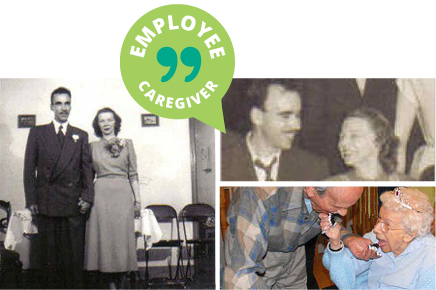Margaret Tannahill-Wade,
cared for her mother and father
My parents were both in their late 80s, and both fairly sick when I became their caregiver. Finding a long-term care home that would keep them together was an impossible task, and I couldn’t imagine separating my parents in their twilight years after almost 60 years of marriage. We sold our respective homes and moved together into one that could accommodate their care needs.
I was so lucky to have a manager who was compassionate and understanding throughout the entire journey. Apart from the flexibility that is built into our union collective agreements, accommodations for carers are predominantly based on the relationship an employee has with their manager.
I used all my vacation days, sick days and personal days to take care of my parents, but they are never enough when caregiving. We were provided with home care support for three hours a day, five days a week. As I was working during the day, I needed more help. My husband retired early and we hired private home care for increased peace of mind. My children were great at providing social interaction, but they weren’t able to take on those heavy caregiving responsibilities.
All of it was worth it. You do anything for your family. My philosophy was to maximize quality of life with my parents, seize the memorable moments, keep my sense of humour (and theirs) and give back every ounce of care they gave to me. My father passed away a year before my mother did. Balancing work and caregiving when my mother was at the end of her life was the hardest both emotionally and physically, amidst hospital visits, care coordination and just being the best daughter I could be. I got time off work and sat with mom for weeks – holding her hand, listening to music, having conversations even when she was unable to speak. These are the moments I am so grateful for – to have had that opportunity to focus on my parents needs, and thankful to be part of a union and having had a compassionate manager.
I now formally work with my union and health workplace office to increase some of those accommodations that workers need to be good carers – whether for children or for elders. We are ranked as one of the top employers in our city, so I believe that we can be leaders in this space and can perhaps be an inspirational example for other employers.

“I used all my vacation days, sick days and personal days to take care of my parents, but they are never enough when caregiving.”

“I used all my vacation days, sick days and personal days to take care of my parents, but they are never enough when caregiving.”
Margaret Tannahill-Wade,
cared for her mother and father
My parents were both in their late 80s, and both fairly sick when I became their caregiver. Finding a long-term care home that would keep them together was an impossible task, and I couldn’t imagine separating my parents in their twilight years after almost 60 years of marriage. We sold our respective homes and moved together into one that could accommodate their care needs.
I was so lucky to have a manager who was compassionate and understanding throughout the entire journey. Apart from the flexibility that is built into our union collective agreements, accommodations for carers are predominantly based on the relationship an employee has with their manager.
I used all my vacation days, sick days and personal days to take care of my parents, but they are never enough when caregiving. We were provided with home care support for three hours a day, five days a week. As I was working during the day, I needed more help. My husband retired early and we hired private home care for increased peace of mind. My children were great at providing social interaction, but they weren’t able to take on those heavy caregiving responsibilities.
All of it was worth it. You do anything for your family. My philosophy was to maximize quality of life with my parents, seize the memorable moments, keep my sense of humour (and theirs) and give back every ounce of care they gave to me. My father passed away a year before my mother did. Balancing work and caregiving when my mother was at the end of her life was the hardest both emotionally and physically, amidst hospital visits, care coordination and just being the best daughter I could be. I got time off work and sat with mom for weeks – holding her hand, listening to music, having conversations even when she was unable to speak. These are the moments I am so grateful for – to have had that opportunity to focus on my parents needs, and thankful to be part of a union and having had a compassionate manager.
I now formally work with my union and health workplace office to increase some of those accommodations that workers need to be good carers – whether for children or for elders. We are ranked as one of the top employers in our city, so I believe that we can be leaders in this space and can perhaps be an inspirational example for other employers.

